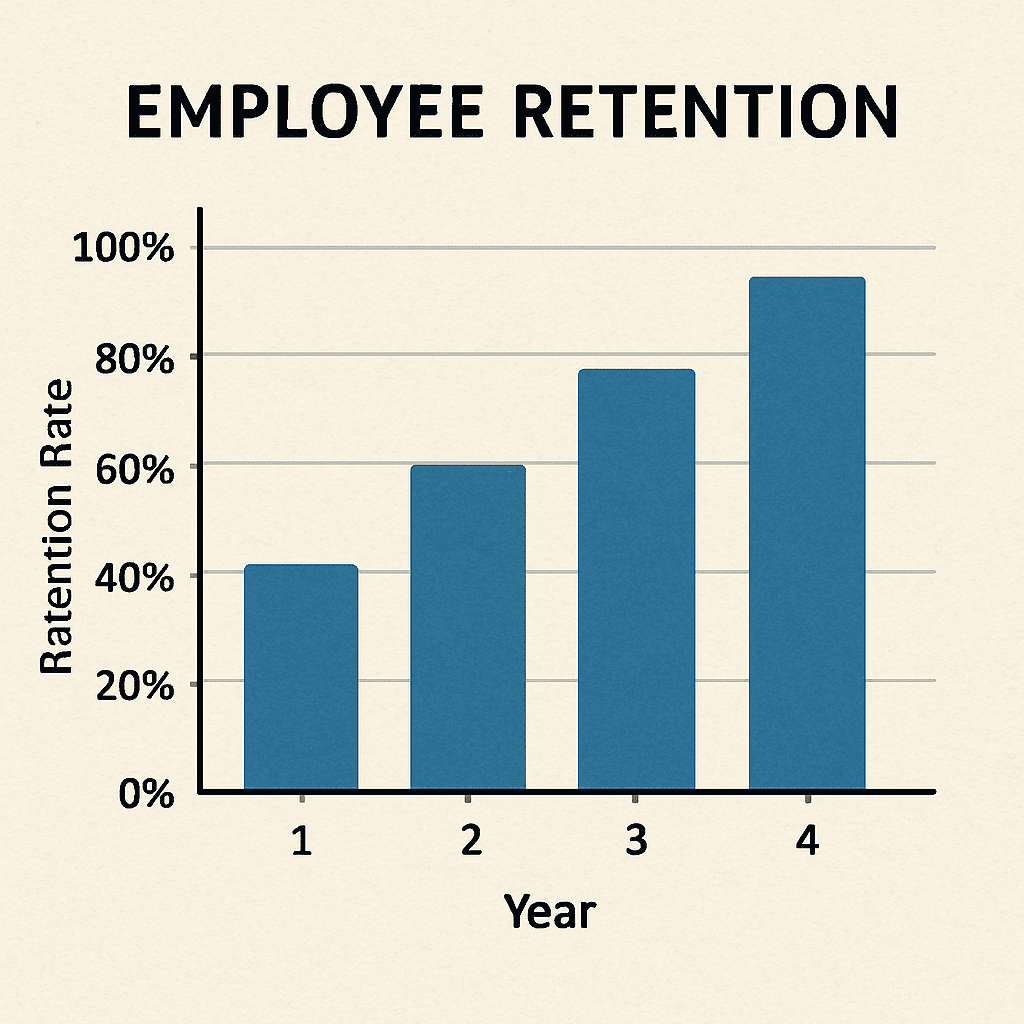
Boost Talent with Equity Compensation in C-Corps
Equity as a Tool for Hiring and Retaining Key Talent in a C-Corporation

Equity compensation refers to the practice of offering shares of company stock as part of an employee's compensation package. Unlike traditional salary or bonuses, equity provides employees with a tangible stake in the company, aligning their interests with those of the organization's success. Equity not only serves as a financial incentive but also fosters a sense of ownership and responsibility among employees, encouraging them to contribute more actively towards the company's goals.
Types of Equity Compensation
There are several forms of equity compensation that C-Corporations can offer:
Stock Options: These give employees the right to purchase company stock at a predetermined price after a certain period or upon meeting specific conditions. Stock options can be a powerful motivator, as employees stand to gain significantly if the company's stock value increases over time. However, it's important for employees to understand the risks involved, such as the possibility of the stock price falling below the exercise price.
Restricted Stock Units (RSUs): These are shares that are granted to employees, but with restrictions that lapse over time, usually tied to continued employment. RSUs are often viewed as less risky than stock options, as they provide value regardless of stock price fluctuations. Employees receive actual shares once the vesting conditions are met, ensuring a guaranteed return on their contribution to the company.
Employee Stock Purchase Plans (ESPPs): These allow employees to purchase company stock, often at a discounted price. ESPPs can enhance employee engagement by allowing them to invest in the company's growth. The discount offered on stock purchases acts as an immediate benefit, while the potential for future growth provides a long-term incentive.
Each type of equity has its own benefits and considerations, which we'll discuss further. Understanding these differences is crucial for both employers and employees to make informed decisions that align with their goals and expectations.
Why Offer Equity in a C-Corporation?
Attracting Top Talent
In the tech industry and other fast-paced sectors, offering competitive salaries isn't always enough to attract the best candidates. Equity compensation can make a significant difference. When potential hires see that they could become part-owners of the company, they may be more inclined to join your team. This sense of ownership can be particularly appealing to entrepreneurial-minded individuals who are looking for more than just a paycheck.
Equity compensation can also be a deciding factor for candidates who are weighing multiple job offers. It signals that a company is invested in its employees' futures and offers a unique incentive that traditional salaries cannot match. For candidates, equity represents a potential to share in the company's success, providing both immediate and long-term value that can surpass mere financial remuneration.
Retaining Key Employees

Once you've attracted top talent, the next challenge is keeping them. Equity compensation is a powerful retention tool. Employees who own a piece of the company are more likely to feel a sense of loyalty and commitment. They have a vested interest in the company's success, which can translate into higher productivity and longer tenure. This alignment of interests helps create a collaborative and focused work environment where employees are motivated to contribute to the company's growth.
Moreover, the vesting schedules associated with stock options or RSUs encourage employees to stay with the company for the long term. As the value of their equity grows, so does their motivation to contribute to the company's success. This structured approach to equity distribution ensures that employees remain with the organization through critical periods of growth and transformation, providing stability and continuity.
Enhancing Company Culture
Equity compensation can also play a vital role in shaping a company's culture. By offering employees a stake in the company's future, businesses can foster a sense of shared purpose and collective responsibility. This approach encourages collaboration and innovation, as employees are more likely to support initiatives that drive the company's success. Furthermore, equity compensation can help bridge the gap between management and staff, creating a more inclusive and transparent environment where everyone's contributions are valued and rewarded.
Implementing Equity Compensation in a C-Corporation
Setting Up an Equity Compensation Plan
Implementing an equity compensation plan requires careful planning and consideration. Here are some steps to guide you:
Define Your Objectives: What do you hope to achieve by offering equity? Whether it's attracting new talent, retaining current employees, or motivating staff, having clear goals will help shape your plan. Understanding the specific needs of your organization and workforce is crucial in tailoring the equity plan to achieve desired outcomes.
Choose the Right Type of Equity: Depending on your objectives, you might choose stock options, RSUs, or ESPPs. Consider the needs of your workforce and the strategic goals of your organization. It's important to assess the potential impact of each type of equity on employee motivation and the company's financial health.
Determine Vesting Schedules: Vesting schedules dictate when employees can exercise their stock options or receive their RSUs. A typical schedule might be a four-year vesting period with a one-year cliff, meaning employees must stay for at least one year before they start earning their shares. Customizing vesting schedules to align with company milestones and employee performance can further enhance the effectiveness of the equity plan.
Communicate Clearly: Transparency is crucial. Make sure employees understand how the equity plan works, including the risks and potential rewards. Regular communication and education sessions can help demystify the complexities of equity compensation and ensure that employees fully appreciate its value.
Monitor and Adjust: Continuously assess the effectiveness of your equity compensation plan and be prepared to make adjustments as needed. Regularly reviewing employee feedback and market trends can help you refine your approach and maintain a competitive edge.
Legal and Tax Considerations
Equity compensation in a C-Corporation comes with legal and tax implications that need careful navigation. It's essential to work with legal and financial experts to ensure compliance with all relevant regulations.
Securities Laws: Equity offerings must comply with federal and state securities laws. This often involves registering the offering or finding an exemption. Non-compliance can result in significant legal and financial penalties, so it's crucial to seek expert advice to navigate these complexities.
Tax Implications: The tax treatment of equity compensation can be complex. Employees may face taxes on the grant, vesting, or exercise of equity, depending on the type of compensation. Understanding the tax implications for both the company and employees is essential to maximizing the benefits of the equity plan.
Employee Education: Given the legal and tax complexities, it's important to provide employees with resources and guidance to help them understand their obligations and opportunities. Offering access to financial advisors or organizing workshops can empower employees to make informed decisions about their equity compensation.
Case Study: Successful Equity Compensation Strategies

by Arthur A (https://unsplash.com/@americanaez225)
Let's look at a real-world example of a C-Corporation that successfully implemented an equity compensation strategy.
Tech Innovations Inc. wanted to attract top-tier software engineers but found that competitive salaries weren't enough. They introduced a comprehensive equity compensation plan, offering stock options with a four-year vesting schedule. This move not only attracted skilled engineers but also significantly reduced turnover rates, as employees felt more invested in the company's future. The company's commitment to transparency and ongoing education ensured that employees fully understood the value of their equity, enhancing their engagement and loyalty.
Tech Innovations Inc.'s experience highlights the importance of aligning equity compensation with company objectives and employee expectations. By carefully designing their equity plan and communicating its benefits effectively, they were able to create a motivated and committed workforce that contributed to the company's success.
Challenges and Considerations
While equity compensation offers numerous benefits, it's not without challenges. Companies must be aware of:
Dilution: Issuing new shares can dilute the value of existing shares, affecting all shareholders. Managing dilution requires careful planning and consideration of the company's capital structure and future funding needs.
Market Volatility: The value of stock options can fluctuate with market conditions, which might not always align with the company's performance. Companies need to communicate potential risks to employees and consider strategies to mitigate the impact of market volatility on equity compensation.
Employee Understanding: Employees need to fully understand the equity program to appreciate its value. This might require ongoing education and communication. Providing clear, accessible information and resources can help employees navigate the complexities of equity compensation and make informed decisions.
Administrative Complexity: Implementing and managing an equity compensation plan can be administratively challenging. Companies need to invest in the necessary infrastructure and resources to ensure efficient plan administration and compliance with legal and regulatory requirements.
Conclusion
Equity compensation is a powerful tool for C-Corporations looking to attract and retain key talent. By offering a stake in the company, you can align employee interests with business success, foster loyalty, and create a motivated workforce. However, implementing such a plan requires careful planning and consideration of legal and tax implications. With a well-designed equity compensation strategy, your C-Corporation can stand out in the competitive job market and secure the talent needed for long-term success.
In conclusion, while equity compensation may seem complex, its potential benefits make it a worthwhile consideration for any C-Corporation aiming to boost its talent acquisition and retention strategies. By understanding the intricacies of equity compensation and effectively communicating its value, companies can create a compelling offer that attracts top talent and builds a committed, high-performing workforce.
Contacts
🌐 Website: gadzhieva.com
📧 Email: svetlana@gadzhieva.com
📱 Phone: (510) 974-3115
💬 Telegram: https://t.me/Svetlana_CPA
📸 Instagram: @gadzhievacpa
💼 LinkedIn: Svetlana Gadzhieva CPA